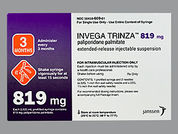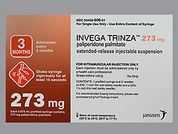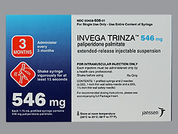See also Warning section.
Before using paliperidone, tell your doctor or pharmacist if you are allergic to it; or to risperidone; or if you have any other allergies. This product may contain inactive ingredients, which can cause allergic reactions or other problems. Talk to your pharmacist for more details.
Before using this medication, tell your doctor or pharmacist your medical history, especially of: kidney disease, low white blood cell count, Parkinson's disease, dementia, certain eye problems (cataracts, glaucoma), seizures, personal or family history of diabetes, high cholesterol/triglyceride levels, heart disease (such as previous heart attack), breathing trouble during sleep (sleep apnea).
Paliperidone may cause a condition that affects the heart rhythm (QT prolongation). QT prolongation can rarely cause serious (rarely fatal) fast/irregular heartbeat and other symptoms (such as severe dizziness, fainting) that need medical attention right away.
The risk of QT prolongation may be increased if you have certain medical conditions or are taking other drugs that may cause QT prolongation. Before using paliperidone, tell your doctor or pharmacist of all the drugs you take and if you have any of the following conditions: certain heart problems (heart failure, slow heartbeat, QT prolongation in the EKG), family history of certain heart problems (QT prolongation in the EKG, sudden cardiac death).
Low levels of potassium or magnesium in the blood may also increase your risk of QT prolongation. This risk may increase if you use certain drugs (such as diuretics/"water pills") or if you have conditions such as severe sweating, diarrhea, or vomiting. Talk to your doctor about using paliperidone safely.
This drug may make you dizzy or drowsy. Alcohol or marijuana (cannabis) can make you more dizzy or drowsy. Do not drive, use machinery, or do anything that needs alertness until you can do it safely. Avoid alcoholic beverages. Talk to your doctor if you are using marijuana (cannabis).
This medication may make you sweat less, making you more likely to get heat stroke. Avoid doing things that may cause you to overheat, such as hard work or exercise in hot weather, or using hot tubs. When the weather is hot, drink a lot of fluids and dress lightly. If you overheat, quickly look for a place to cool down and rest. Get medical help right away if you have a fever that does not go away, mental/mood changes, headache, or dizziness.
Before having surgery (including cataract/glaucoma eye surgery), tell your doctor or dentist if you are using or have ever used this medication, and about all the other products you use (including prescription drugs, nonprescription drugs, and herbal products).
Older adults may be more sensitive to the side effects of this drug, especially drowsiness, dizziness, lightheadedness, and QT prolongation (see above). Drowsiness, dizziness, and lightheadedness can increase the risk of falling.
During pregnancy, this medication should be used only when clearly needed. Babies born to mothers who have used this drug during the last 3 months of pregnancy may rarely develop symptoms including muscle stiffness or shakiness, drowsiness, feeding/breathing difficulties, or constant crying. If you notice any of these symptoms in your newborn especially during their first month, tell the doctor right away.
Since untreated mental/mood problems (such as schizophrenia) can be a serious condition, do not stop taking this medication unless directed by your doctor. If you are planning pregnancy, become pregnant, or think you may be pregnant, talk with your doctor right away about the benefits and risks of using this medication during pregnancy.
This medication passes into breast milk and may have undesirable effects on a nursing infant. Tell the doctor right away if your baby develops symptoms such as muscle stiffness or shakiness, unusual sleepiness, or difficulty feeding. Consult your doctor before breastfeeding.



